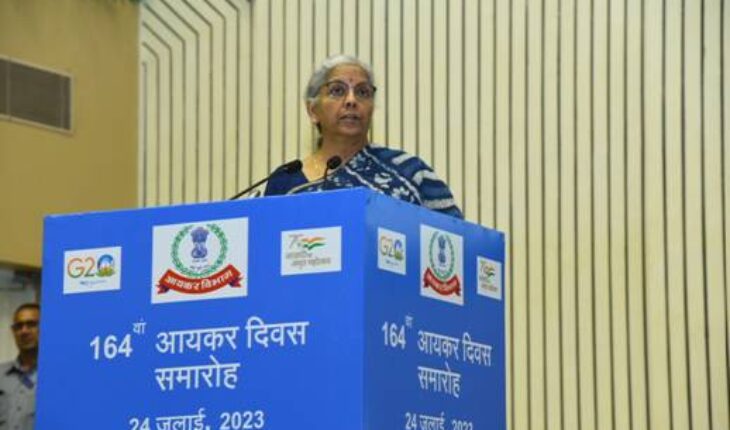
164th Income Tax Day celebrated on 24th July 2023. On this day , for the first time, tax on income was collected in India. In 1857, the Indians tried to get independence in an organized way, due to which the British rule suffered a huge loss, which was compensated by imposing income tax.
Even though it has been more than 7 decades since the country got independence. Still, the number of income tax filers is nominal. Still, income tax is not deposited by many businessmen. Not only this, businessmen also do not file income tax returns. Due to this reason, there has been an increase of only 1.63 percent in the number of income tax payers in the last 5 years. However, there has been an increase of 73 percent in the case of personal tax deposits and this success has been achieved by the Income Tax Department due to technology, because now both salaried and non-salaried individuals cannot hide the interest income earned in the bank. Now everyone will have to pay tax on such income.
Only 6.2 per cent of the less than 70 million taxpayers in India file income tax returns, more than 5.5 per cent file zero tax returns, while about 60 per cent of the taxable population in the USA file income tax returns. While only 0.70 per cent of the taxable population in India pays income tax. In this country with a population of about 140 crores, the number of people who pay 30 per cent income tax is only 60.8 lakhs & they have Rs 10 lakhs income per annum, whereas in the financial year 2021-22 this number was 48 lakhs.
In India, 6.2 percent of about 70 million people file income tax returns, while 59.9 percent in USA, 56 percent in Britain, 58 percent in France and 9.8 percent in China. People pay less tax in India when the tax rate here is very less as compared to developed countries. The tax rate is 54 per cent in Canada, 51.6 per cent in the USA, 49 per cent in France, 47 per cent in Italy, 45 per cent in South Africa, China, Japan and Germany, 40 per cent in the UK and 37 per cent in India. In many countries of the world, almost no income tax is collected. Countries like Malta, Cyprus, Andorra, Singapore, Antigua, Luxembourg, Iceberg, Ireland, Mauritius, Monaco, Switzerland, Bahamas, Bermuda etc. fall in this category.
In developed countries the income tax rate is high and at the same time, nominal tax is collected in a few countries, however, the facilities provided to the citizens are many times more and better than the facilities provided in India. Apart from this, indirect tax in India is also collected from the direct taxpayers. If direct and indirect taxes are combined, then a person paying 30 percent income tax has to spend more than 50 percent of his income in paying taxes to the government. Due to such a situation, neither development is taking place in the country nor citizens are getting better facilities.
In the financial year 2021-22, the number of taxpayers paying more than Rs.1 lakh in the country is 30,08,033, taxpayers paying tax between Rs.1 and 10 lakh are 27,93,463, the number of people paying income tax between Rs.10 and Rs.50 lakh is 1,96,535, the number of people who paid tax between Rs.50 lakh and Rs.1 crore was 12,963 and the number of people who paid income tax more than Rs.1 crore was 5,072. According to the figures of the financial year 2021-22, the percentage of those earning less than Rs.2.5 lakh in the country is 57 percent, while the percentage of those earning Rs.2.5 to Rs.5 lakh is 18 percent, the percentage of those earning Rs.5 to Rs.10 lakh is 17 percent, those earning Rs.10 to Rs.50 lakh. 7 percent and 1 percent of those earning more than 50 lakhs.
According to the data available till August 2020, Uttar Pradesh is at the first place with a share of 18 percent in income tax filers, Bihar at the second place with a contribution of 10 percent and Madhya Pradesh at the third place with a share of 8 percent. Maharashtra and Rajasthan are at the fourth position with a share of 6 per cent each. These figures show that the people of Bimaru states are better than the developed states in terms of depositing income tax.
Salaried people in India pay the maximum tax, while non-salaried people, which include professionals such as doctors, lawyers, chartered accountants, architects and businessmen, pay less tax. According to an estimate, non-salaried individuals in the country file an income tax return of Rs 31,500 on an average, while salaried individuals file an income tax return of over Rs 90,000. 96 percent of non-salaried people file income tax returns of less than Rs 10 lakh, while 88 percent of salaried people file income tax returns of less than Rs 5 lakh.
In our country, non-salaried people get many exemptions in income tax, due to which their tax liability is less, in spite of this, some businessmen do tax evasion. Having a machine in the factory, small businessmen get the benefit of 10 percent of the cost of the machine in the form of depreciation, that is, if a person has a machine worth Rs 10 lakh in his factory, he will get the of benefit of 10 percent of the cost of machine .
By the way, there are some other reasons for depositing less income tax, for example, due to the informal economy in India, a large part of economic activities is still outside the purview of the government monitoring system, due to which a section of businessmen do not deposit income tax.
Many small businesses, such as street vendors, daily wage workers, etc. fall under the informal sector, due to which it is not easy for the government to track their income. Another reason for the low tax base in India is the low participation of women in the work force.
According to a World Bank report released in June 2022, there has been a steady decline in the labor force participation of Indian women since 2005 and is set to fall to a low of 19 per cent in 2021. A large population of India is still dependent on agriculture. Since agricultural income is exempt under Income Tax, due to which almost 50 percent of farmers do not file Income Tax Returns.
In the old and new tax regime, income tax has to be paid only when the income is above a certain limit. In the old tax system, no income tax has to be paid to those earning up to Rs.5 lakh. The annual income of a large population in India is less than 5 lakhs and those with this much income are exempted from paying income tax. Not only this, those whose income is up to 5 lakhs also refrain from filing income tax returns.
Obviously, bringing informal businesses and workers into the tax net will benefit both the country and the general public. Therefore, businessmen should be encouraged to self-register their businesses with the government machinery and comply with tax laws. The Goods and Services Tax (GST) system can also help in this task. Depositing income tax regularly can get financial help from the bank and can also get the benefit of government schemes. With the help of GST, the benefit of deposit of input tax can be availed and the large buyers can get benefit in continuation of supply.
High earners can be identified with the help of bank transactions, credit cards, property purchases, etc. to bring them under the income tax net. The income of some farmers is in lakhs and crores of rupees, but they do not pay taxes. Tax base can also be increased by bringing agricultural income into the tax net.
Collecting tax at source in the course of purchase of certain goods and services can also identify potential taxpayers. Many people in the country earn huge amount every year, but they steal without any fear. Currently TCS is collected on expensive motor vehicles, gold jewelery or money transferred abroad etc. but the scope can be extended to consumer durables, domestic luxury travel, stay in expensive hotels etc.
It can be said that there are many anomalies related to income tax in our country. Salaried people are paying tax, but some professionals and businessmen are evading tax. There are also some loopholes in the matter, for example, the government has failed to collect taxes from the businessmen working in the informal sector. Along with this, the taxpayers who are depositing taxes are not getting the expected facilities, due to which there is a lot of anger in their mind about the way and system of the government.
Satish Singh, Ahmedabad based Senior Columnist, Views are personal.
Mobile No.8294586892





